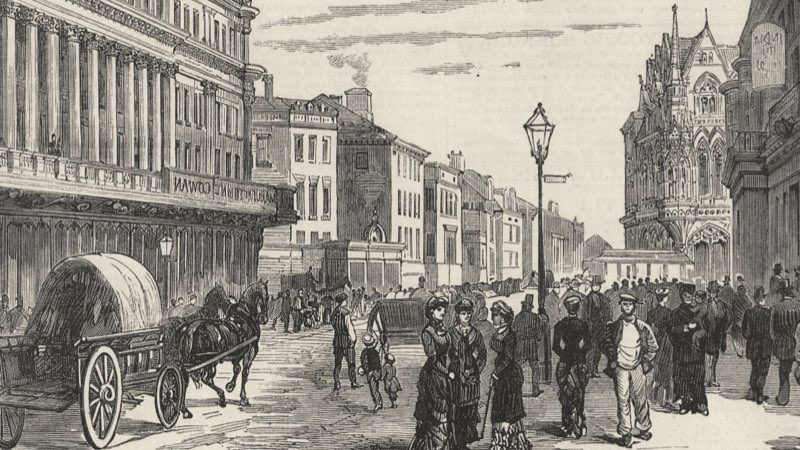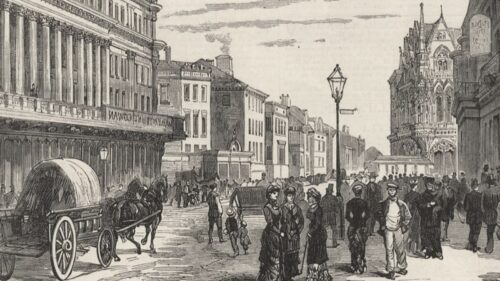
The Life And Ministry Of Samuel Turner
Gospel Standard 1854:
Death. On May 10th, 1854, at Sunderland, aged 70, Samuel Turner, minister of the gospel.
Mr. Turner was born in London, and was called to a knowledge of himself as a sinner and the Lord Jesus Christ as a Saviour, under that unequalled minister of Christ in modern times, the late William Huntington, whom he dearly loved. It appears from Mr. T.’s statements to many of his friends, that he was brought to know the Lord in his youth, and by the Holy Spirit was separated to the work of the ministry about 50 years ago. He was made instrumental to the deliverance of many poor sin-burdened, law-condemned souls, and as an experimental minister in the sweetness of the love of Christ, the condemnation of the law, the temptations of Satan, the deceitfulness of the heart, and the quickening, convincing, enlightening, pardoning, justifying, sanctifying, comforting, and remembrancing operations of the Holy Ghost, he had few equals. He was a diligent student of God’s most holy word; and his memory in the precious word failed him very little up to his death, although he lived to the advanced age of 70 years. He was a very temperate person, and a lover of hospitality, and a devout, affectionate, and steadfast friend of the doctrines of the everlasting gospel, the unction of which he often experienced, and others through him as the instrument. He was no man-pleaser nor perverter of the word of God; no grace and works mixer, nor creature-exalter at the expense of truth. Salvation by grace alone, through our Lord Jesus Christ, by the ministration of the Holy Ghost, was his constant topic, in the pulpit and out of it, for he knew what an extensive debtor he was to rich, free, and sovereign grace. He has left many writings behind him which prove his diligence in, and love of, the covenant of grace. In the beginning of his last affliction he was quite in the dark as to its termination; but, as it advanced, he inclined to think that it would terminate in his death. Nevertheless, he expressed a willingness to acquiesce in his dear Lord’s way, whether to die or to live longer. In a conversation which he lately had with one of his deacons, he said, “I feel my bodily strength gradually failing, and for some time death and I have been walking arm in arm. Sometimes we are very agreeable, and sometimes we quarrel; but yet I do hope the Lord will support me to the end, and that I shall, like Samson, slay more at my death than I have done all my lifetime, and many I shall never know of until I meet them in glory.” The last text which he preached from was Ps. 25:13: “His soul shall dwell at ease, and his seed shall inherit the earth.” He was kept very comfortable in his soul during his affliction, and had not, up to the day previous to his death, suffered very severely in his body. But he was very ill the day before he died, yet at night he seemed to rest tolerably well. On the morning of Wednesday, the day on which he died, he evinced great weakness, when his daughter, who was waiting upon him, gave him some beef tea. But as soon as he got it, he felt something rise in his chest, which nearly suffocated him. After struggling for breath for some time, he at length was enabled to ask for the hymn-book, and quoted the first line of one of Hart’s:
“Bless the Lord, my soul, and raise
A glad and grateful song
To my dear Redeemer’s praise,
For I to him belong.”
His daughter read the whole of the hymn to him, and asked him if he felt it comfortable. “O yes,” he replied, “I have been a highly-favored creature all my life, surrounded with loving-kindnesses and tender mercies. 1 have had sweet meditation on the covenant characters of my precious Christ, and of the Lord’s gracious leadings of me in the wilderness; but O the ingratitude and want of love for such goodness and mercy manifested to me!” A few hours before he died, he asked the doctor if he did not think his end was near. The doctor said it was. “Then,” he replied, “I may just say now, what I wrote to a friend nearly 60 years ago, in the ‘First Mite to the Treasury,’ (referring to a valuable work he has written,) that my first prayer was ‘God be merciful to me a sinner;’ and now it is about to be fulfilled.”
He then quoted 1 Cor. 2:9, and shortly afterwards said, “But I may say with the poet,
“Lord, it is my chief complaint,
That my love is weak and faint;
Yet I love thee and adore;
O for grace to love thee more!'”
Then, again, he commented on the Lord’s goodness and kindness to him, and deplored his backslidings from him and ingratitude too, and added, “Yet heaven and earth are not firmer than God’s plan of salvation by Jesus Christ.” After slumbering a little, one of the deacons of the church came in and inquired if he was comfortable in his mind. He replied, “O yes, I have solid peace and comfort, and have been highly favored during my affliction, in four things: 1st. My head has been kept quite clear and free from pain; 2nd. I have suffered comparatively little pain; 3. The Lord has favored me with sweet meditations on the covenant of grace; 4th. If possible, I am more confirmed in the truth of the precious doctrines of the everlasting gospel.” After slumbering a little, he was aroused by excruciating pain; and, putting his hands together, he said with great earnestness and much fervor, “Lord, have mercy upon me! O Lord, relieve me!” After a short time, he attempted to quote a hymn, 404th of his own Selection, but could only articulate,
“And when our life’s last hour is come;”
the following lines of which read,
“Let us but die as in thy sight,
And death shall vanish “with delight,”
which were kindly read to him; and shortly after he fell asleep in Jesus, on the 10th of May, 1854, in his own house, in Nile Street, Sunderland, in the county of Durham. “Blessed are the dead which die in the Lord.”
Samuel Turner (1784-1854) was a High-Calvinist gospel preacher. He served several years as pastor for the congregation meeting at Hemsley Blackmore, Yorkshire, having been recommended to the church by William Huntington. He later served as pastor for the church meeting at Corn Market Chapel, Sunderland.




